“Why Do We Need an RV? In today’s travel landscape, RVs have become essential for those craving flexibility, affordability, and a deeper connection with nature. They offer the freedom to explore on your terms, from saving on accommodation costs to fostering family bonding and enabling spontaneous adventures. Let’s dive into the reasons why RVs are not just vehicles, but gateways to unforgettable journeys and a lifestyle centered around exploration and independence.”
How popular are RVs?
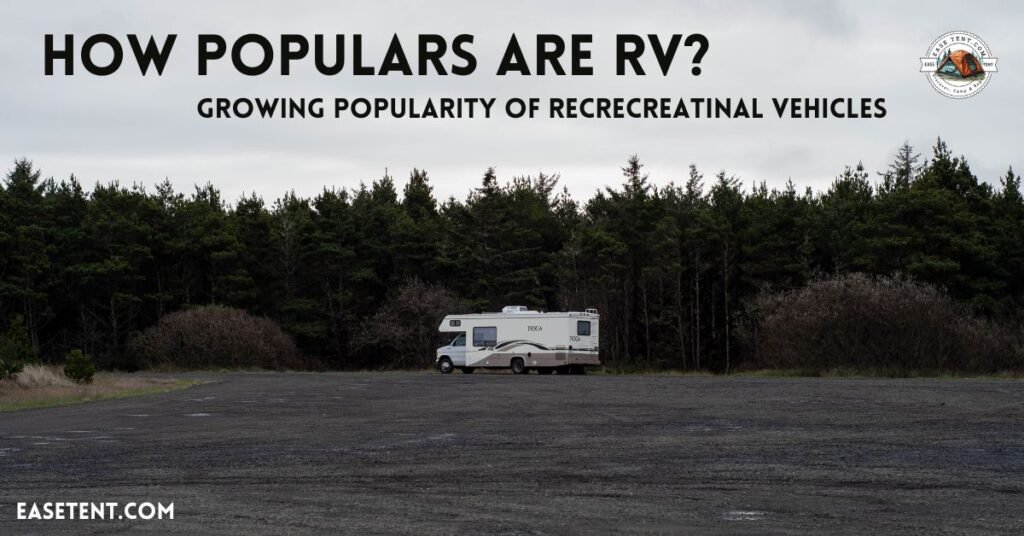
RVs have experienced a significant increase in popularity over the past few years. This growth is evident in rising sales figures and increased interest in RV travel and lifestyles. According to industry reports, RV shipments and sales have consistently shown an upward trend since around 2017. Especially, Since the COVID-19 pandemic began, more people have turned to motorhomes and RVs for their vacations. Because these vehicles offer a safer way to travel because you can stay self-contained and avoid crowded places like hotels and restaurants. The demand for RVs has grown a lot since 2017, as shown in the chart below. This trend reflects how many people are choosing RVs as a flexible and enjoyable way to explore while staying safe during these uncertain times.
[ays_chart id=”3″]
How many RVs are sold each year in the US?
[ays_chart id=”2″]
What type of RV sells the most?
Traveling with an RV eliminates the hassle of relying on local transportation. You have the freedom to explore multiple destinations without worrying about schedules or finding transportation. Additionally, having your own accommodations means no more searching for hotels or packing and unpacking at each stop. With an RV, you can bring everything you need with you, from clothes to outdoor gear, making packing and traveling much more convenient. Moreover, RV travel allows you to experience nature up close, waking up to scenic views and outdoor adventures right outside your door. Lastly, traveling with an RV promotes a sense of community, as you connect with fellow RVers at campgrounds and share stories and experiences along the way.
Cost-Effective
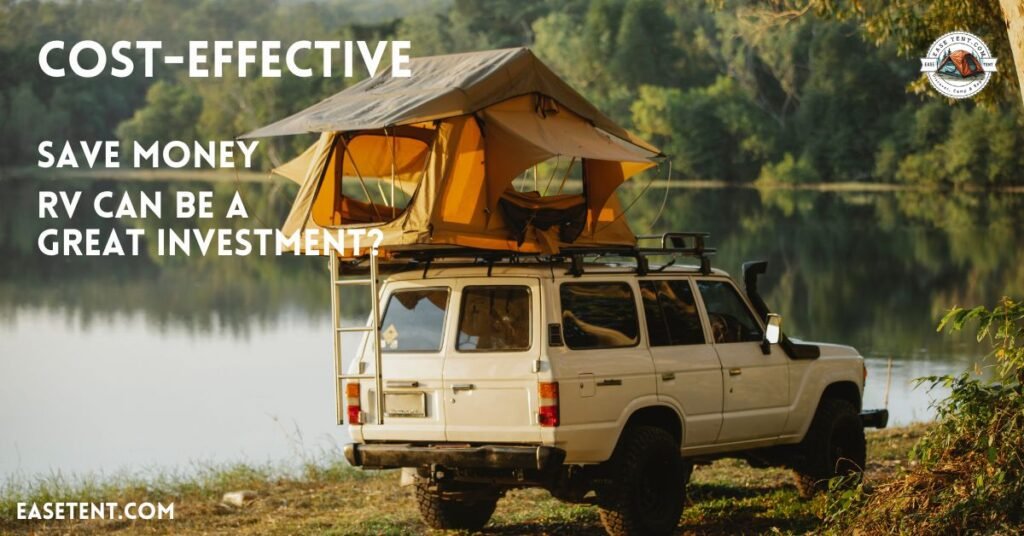
SAVE MONEY
Traveling with a camper can save you money in several ways. By having your own kitchen on wheels, you can cook your meals instead of eating out, everyone knows how expensive it is to eat from the restaurant. Additionally, staying at campgrounds or boondocking (free camping) sites can be more affordable than hotels, saving you accommodation costs. motorcaravan travel also minimizes the need for expensive flights or rental cars, allowing you to stretch your travel budget further and explore more destinations within your means. Overall, the cost-effectiveness of RV travel makes it an attractive option for budget-conscious travelers looking to enjoy memorable experiences without breaking the bank.
RV Can be a great investment?
Investing in an RV can be a great decision for several reasons.
First, it offers the potential for long-term savings on vacation costs, as you can use the RV repeatedly for future trips without incurring additional accommodation expenses.
Second, an RV provides flexibility for spontaneous getaways, allowing you to explore new destinations on your schedule.
Third, owning an RV can enhance your lifestyle by promoting outdoor adventures, family bonding, and relaxation.
Lastly, if well-maintained, RVs can retain their value over time, offering the possibility of resale or trade-in for upgrades in the future. Overall, investing in an RV can provide both financial and lifestyle benefits for avid travelers and outdoor enthusiasts.
Family Bonding
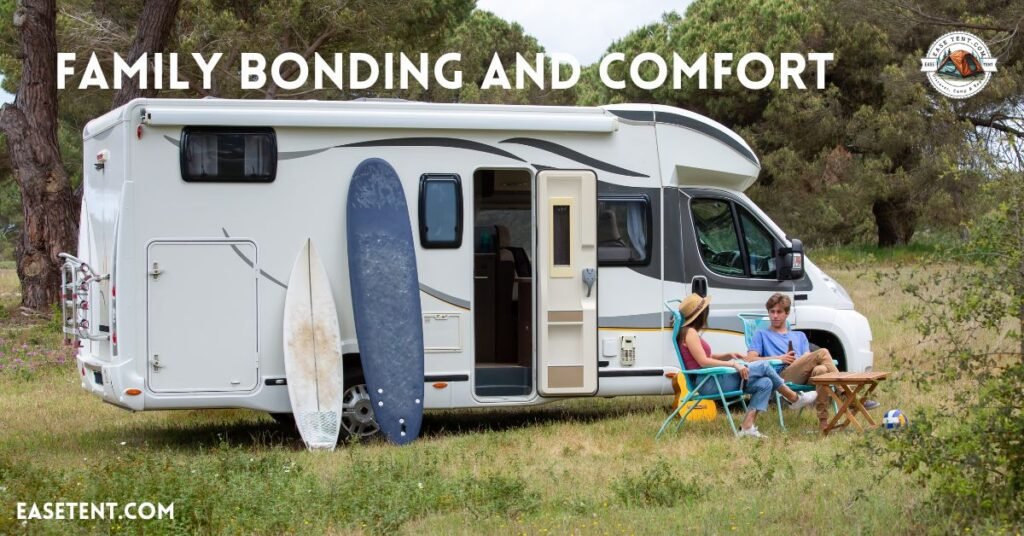
Get Closer to Your Loved Ones
Traveling with an RV offers a unique opportunity to get closer to your loved ones. With the close quarters and shared living space of an RV, you’ll find yourselves spending quality time together, whether it’s cooking meals, playing games, or simply enjoying the journey. The intimate setting fosters stronger bonds and communication among family members or travel companions.
Additionally, RV travel allows you to disconnect from distractions and focus on building meaningful connections with your loved ones while exploring new destinations. The shared experiences and memories created during RV trips can deepen relationships and create lasting bonds that are cherished for years to come. Overall, RV travel is a wonderful way to strengthen relationships and create unforgettable moments with the people who matter most to you.
Bring Your Pets
Bringing your pets along on an RV adventure can enhance your tourism experience in many ways. Camper travel allows you to share new adventures and experiences with your furry companions, creating lasting memories together. Pets feel more at ease in familiar surroundings, and having your RV as a home base provides them with a comfortable and secure environment throughout the journey.
Traveling with pets in an RV also eliminates the stress of finding pet-friendly accommodations or boarding facilities. You can explore pet-friendly destinations, go for hikes, or visit parks with your pet by your side. Trailers offer convenient amenities like food and water bowls, space for bedding, and easy access to exercise areas, making it convenient to care for your pets while on the road.
Moreover, if you are a pet lover then you will know that having your pets with you adds joy and companionship to your travels. They become part of your adventure, enjoying new sights, smells, and experiences alongside you. Mobile home travel with pets promotes bonding and strengthens the relationship between pet owners and their furry friends, fostering a sense of togetherness and shared excitement throughout the journey. Overall, bringing your pets on an RV trip can enhance the overall experience and make your travels more fulfilling and enjoyable for everyone involved.
Exploration of Nature
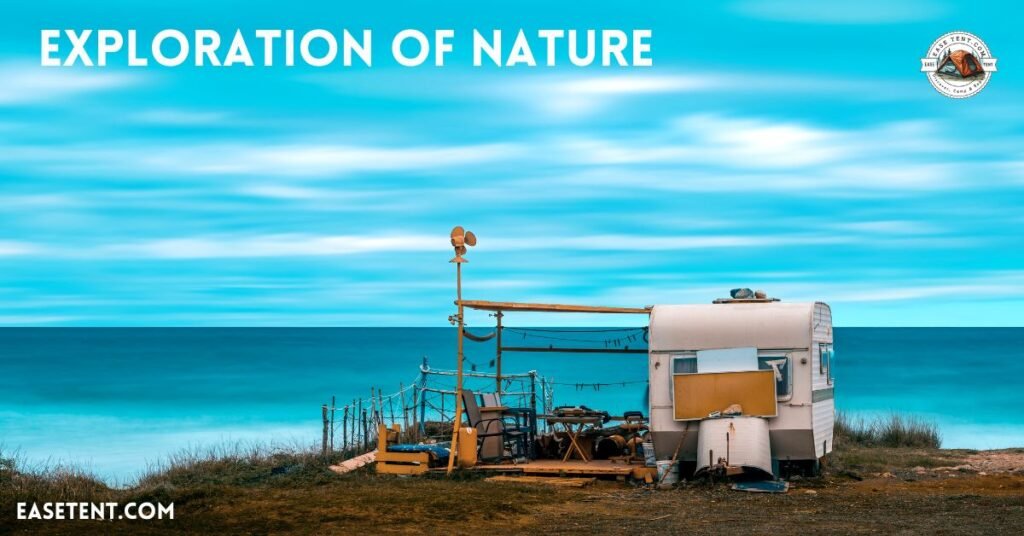
Being More Adventurous
Traveling with a recreational vehicle encourages a spirit of adventure and exploration. Unlike traditional vacations that may be limited to specific destinations or routes, camper travel allows you to embrace naturalness and discover new places along the way. You have the freedom to veer off the beaten path, explore remote areas, and uncover hidden gems that you wouldn’t encounter otherwise.
RVs enable you to immerse yourself in outdoor adventures such as hiking, fishing, kayaking, or simply enjoying nature’s beauty right outside your door. The flexibility of RV travel allows you to chase sunsets, wake up to stunning landscapes, and experience the thrill of the open road firsthand.
Moreover, traveling with an RV fosters a sense of independence and self-reliance. You become more resourceful as you navigate different terrains and adapt to changing environments. Overcoming challenges and unexpected situations on the road adds excitement and fulfillment to your journey, encouraging personal growth and a deeper connection with nature and the world around you.
Overall, Van travel opens up a world of possibilities for those seeking adventure and a break from routine. It encourages you to embrace the unknown, step out of your comfort zone, and create unforgettable experiences that inspire a sense of wonder and discovery. If you’re looking to inject more excitement and spontaneity into your travels, hitting the road with an RV is a fantastic way to satisfy your adventurous spirit.
Unique Way to Make Connection with Nature
Traveling in an RV provided a unique opportunity to deeply connect with nature during our trip. We chose scenic camping spots surrounded by mountains and lakes, immersing ourselves in the sights and sounds of the wilderness. Each morning, we woke up to breathtaking views right outside our RV door, feeling truly connected to the natural world. We enjoyed outdoor activities like hiking, wildlife watching, and stargazing, appreciating the beauty of untouched landscapes. Being in nature with the comforts of our RV allowed us to forge a deeper bond with the environment, fostering a sense of awe and gratitude for the planet we call home.
Photographs for memories
Capturing photographs during our RV adventure was a delightful way to preserve memories. From stunning landscapes to candid family moments, our camera documented the essence of our journey. Each photo told a story, reminding us of the places we explored and the experiences we shared. Whether it was a scenic sunset over the mountains or a spontaneous picnic by a tranquil lake, these photographs became cherished mementos that we could look back on and share with loved ones. The ability to capture memories through photography enhanced our RV travel experience, allowing us to relive the magic of our adventure long after the trip ended.
Flexibility and Freedom in RV Travel
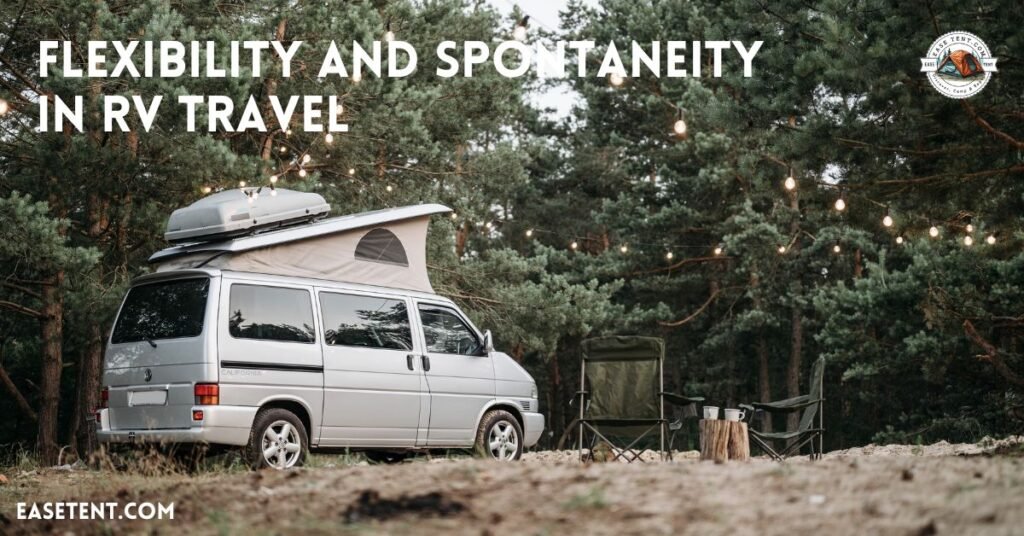
Freedom to Explore
Traveling with a caravan offers you the freedom to see the world in a relaxed and flexible way. Unlike typical vacations where you follow strict schedules, travel trailer trips let you decide where to go and what to do along the journey. You can discover unique places off the tourist track, try regional restaurants, cook your meals in a Van kitchen, or stay longer in beautiful spots that catch your eye. This freedom means you can enjoy spontaneous adventures and create memories without feeling rushed. Living in an RV is all about embracing life and making every day an exciting exploration of new places and experiences.
Adaptability to Weather
RV travel offers adaptability to weather conditions. If the forecast changes unexpectedly, you can easily adjust your plans by finding alternate routes or seeking indoor activities nearby. In inclement weather, you have the comfort of your RV to retreat to, providing a cozy and secure environment until conditions improve. This adaptability ensures that your travel experience remains enjoyable and safe regardless of the weather.
Instant Accommodations
Traveling with an RV provides instant accommodations wherever you go. Your RV serves as a comfortable and convenient “home on wheels,” offering sleeping quarters, a kitchen, and a bathroom at your disposal. Whether you’re on a road trip or exploring new destinations, you have the elasticity to park and stay overnight without the need to book hotels or housing in advance.
Quick Set-Up and Departure
Setting up camp with an RV is quick and straightforward. Modern RVs are equipped with efficient systems for leveling, hooking up utilities, and deploying amenities like slide-outs. This means you can arrive at your destination, quickly set up camp, and be ready to relax or explore in no time. Similarly, when it’s time to depart, packing up is efficient, allowing you to hit the road swiftly and continue your journey.
Unexpected social interactions
Meeting Fellow Travelers
Traveling in a motor home provides opportunities to meet fellow travelers and connect with like-minded individuals on the road. Whether you’re staying at campgrounds, RV parks, or attending events, RVers often share a sense of company and adventure. Meeting fellow travelers can lead to valuable exchanges of travel tips, stories, and recommendations, fostering new friendships and creating memorable connections during your journey.
Community Gatherings
RV communities often host gatherings and events where travelers can come together to socialize and participate in group activities. These gatherings may include potluck dinners, campfire chats, or organized outings to nearby attractions. Joining community gatherings allows you to engage with other RVers, share experiences, and enjoy a sense of belonging to a supportive and welcoming community of fellow travelers.
Shared Experiences
Traveling in an RV fosters shared experiences with family, friends, and new acquaintances. Whether it’s exploring scenic trails, enjoying outdoor meals together, or simply relaxing under the stars, caravan adventures create lasting memories that are shared with those around you. Sharing experiences with others enhances the sense of adventure and camaraderie, making every moment on the road more meaningful and enjoyable.
Two years ago in 2022, I ventured on a camping trip near Napa Sonoma, California, where I met Jake, a fellow outdoor enthusiast. We instantly clicked and have since made it a tradition to camp together every few months with our girlfriends. Our shared love for nature and camping has strengthened our friendship and created cherished memories under the stars.
It’s my own experience whenever I go out I will make a lot of friends and get a chance to meet with my fellow camping members, from all of these guys I get tons of experience.
Perfect for social distancing
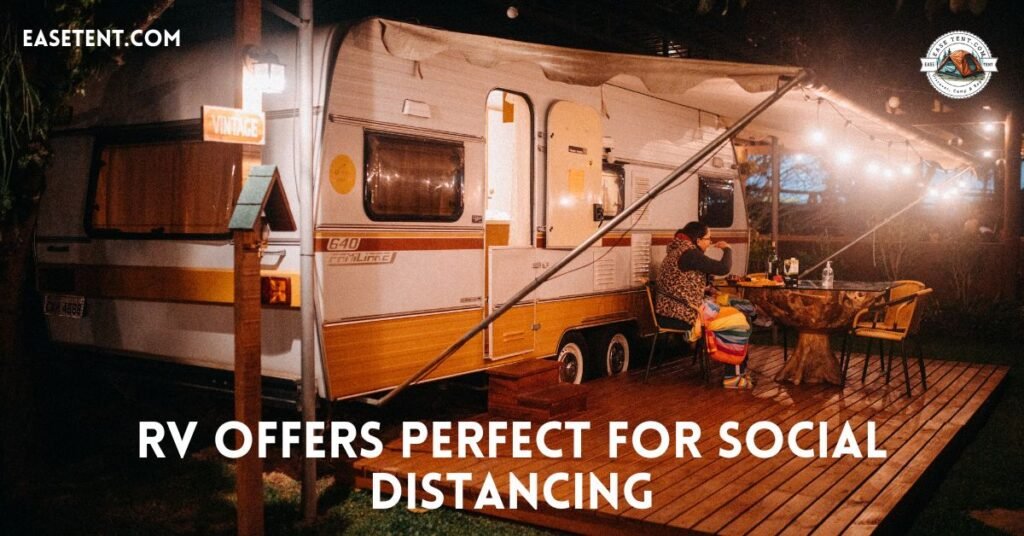
As I said you can make new relationships by engaging with your fellow campers on trips and campgrounds. However, if you are an introvert like me, you can also have the option to maintain social distancing and enjoy solitude when desired. RVs provide a comfortable and private retreat where you can unwind and recharge after socializing, giving you control over how much interaction you have with others. This flexibility is one of the many benefits of RV travel, catering to different personality types and allowing everyone to experience the journey in their own way. Whether you seek companionship or solitude, an RV adventure can be tailored to suit your preferences and provide a fulfilling travel experience.
Privacy and Comfort
Traveling with an RV offers unparalleled privacy and comfort during your adventures. Your RV serves as a personal sanctuary, providing a private space where you can relax, unwind, and recharge after a day of exploring.
Relaxation and Convenience
Privacy in an RV means you can relax and unwind in peace. Whether you want to read a book, take a nap, or enjoy a leisurely meal, you can do so in the comfort of your own space. Additionally, having all your belongings readily accessible makes life on the road convenient and stress-free.
Enhanced Security
Traveling in an RV provides a sense of security and peace of mind. You have your belongings with you at all times, eliminating concerns about luggage or valuables left behind in hotel rooms. This added security contributes to a more relaxed and enjoyable travel experience overall.
Ensuring Privacy Wherever You Go
Whether you’re on a road trip with family or enjoying quality time with your loved ones, traveling in an RV like a caravan or motorhome ensures privacy wherever you go. Your RV provides a personal and intimate space where you can relax, share moments, and enjoy each other’s company without intrusion. Whether parked in a campground or exploring remote locations, the privacy of your RV allows you to create meaningful experiences and cherished memories in a comfortable and secluded environment.
Tax Benefits of RV Ownership
Owning an camper can offer several potential tax benefits depending on your circumstances. Here are some ways you might benefit:
Second Home Deduction
The second home deduction is a tax benefit that allows you to deduct the interest paid on a loan used to purchase or improve a qualified second home, including certain types of RVs. To qualify for this deduction, your RV must have sleeping, cooking, and bathroom facilities, making it suitable for use as a second residence.
To claim the second home deduction for your RV, you must meet specific IRS criteria, such as using the RV as a residence for part of the year. The interest deduction is subject to limits based on the total amount of mortgage debt secured by your primary and secondary residences.
Business Deductions
Business deductions related to an RV can include expenses for business travel, such as fuel and campground fees when used for trade shows or client meetings. You can also deduct depreciation over time for the RV’s business use, along with costs for repairs, maintenance, insurance, and registration fees. Keeping accurate records and demonstrating the RV’s primary use for business purposes is essential to claiming these deductions successfully. Consult a tax professional for guidance specific to your situation and to ensure compliance with IRS regulations.
State Sales Tax Deduction
The state sales tax deduction allows you to deduct the sales tax paid on your RV purchase when itemizing deductions on your state income tax return, if applicable in your state. This deduction can be advantageous for reducing your taxable income and potentially lowering your overall tax liability. To claim this deduction, you’ll need to keep records of the sales tax paid at the time of your RV purchase and meet any specific requirements set by your state’s tax laws. Consult with a tax professional or accountant to determine if you qualify for the state sales tax deduction and how to properly claim it on your tax return.
Depreciation Deduction
The depreciation deduction for a motor caravan allows you to deduct a portion of the RV’s cost over its useful life, particularly if it’s used for business or rental purposes. This deduction helps offset the reduction in value that occurs as the RV ages and is used. To claim depreciation, you must determine the RV’s depreciable basis, which typically excludes land value, and choose a depreciation method approved by the IRS, such as the Modified Accelerated Cost Recovery System (MACRS). Keep accurate records of RV usage and depreciation calculations to support your deduction claims. Consulting with a tax professional is recommended to ensure compliance with IRS guidelines and maximize depreciation deductions for your specific situation.
RV Park Expenses
Camper park expenses may be deductible under certain circumstances, particularly if you use your RV as a primary or secondary residence. If you live in your trailer full-time or for extended periods and it serves as your main dwelling, you may be able to deduct RV park fees as housing expenses.
To qualify for this deduction, you must meet IRS guidelines for claiming your motor home as a primary or secondary residence. This typically involves using the RV for a specific number of days per year and having onboard basic living amenities like sleeping, cooking, and bathroom facilities.
Keep detailed records of your RV park expenses, including receipts and documentation of your RV’s use as a residence, to support your deduction claims. Consulting with a tax professional is advised to ensure eligibility and compliance with IRS regulations regarding RV park expense deductions.
What to look for in an RV?
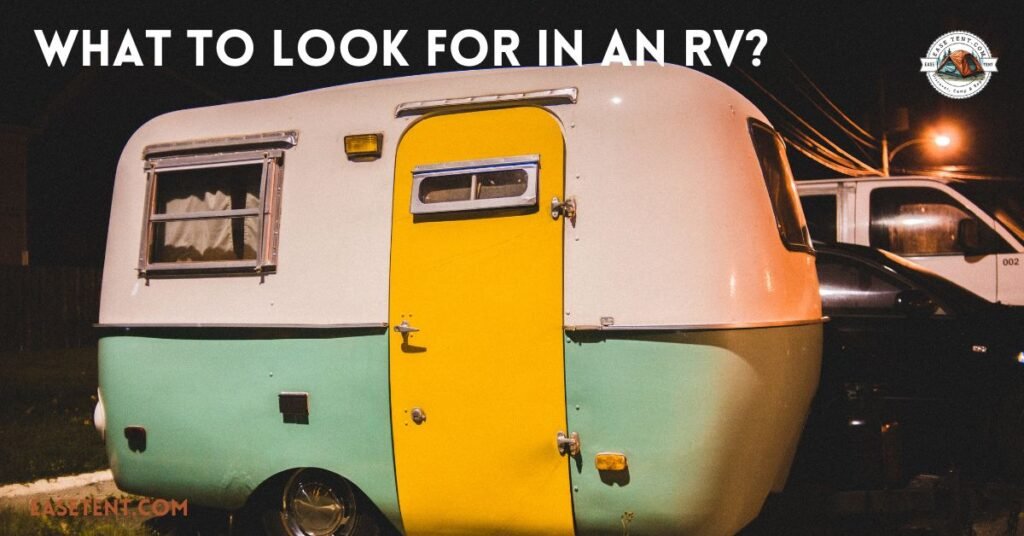
When looking for an RV, consider these important factors:
Size and Layout
Choose an RV size and layout that fits your lifestyle and travel needs. Consider sleeping capacity, living space, kitchen amenities, and bathroom facilities.
Quality and Construction
Inspect the overall build quality, including materials used, cabinetry, flooring, and finishes. Look for sturdy construction that can withstand travel and weather conditions.
Amenities and Features
Check for essential amenities such as a functional kitchen with appliances, comfortable sleeping areas, sufficient storage space, and entertainment options like TV and audio systems.
Mechanical Condition
Evaluate the engine (for motorized RVs) and mechanical systems such as brakes, suspension, tires, and generator. Ensure all systems are in good working order.
Water and Electrical Systems
Check plumbing for leaks, water pressure, and functionality of faucets, toilets, and showers. Inspect electrical systems for proper wiring, outlets, and battery condition.
Safety Features
Look for safety features including smoke detectors, carbon monoxide alarms, fire extinguishers, and proper seat belt installations.
Storage and Cargo Capacity
Assess the available storage compartments both inside and outside the RV for carrying gear, supplies, and personal belongings.
Towing Capacity (for towable RVs)
If considering a towable RV like a travel trailer or fifth wheel, ensure your vehicle can safely tow the RV based on its weight and towing capacity.
Budget and Affordability
Determine your budget and consider both upfront costs and ongoing expenses such as insurance, fuel, maintenance, and campground fees.
By carefully evaluating these factors, you can choose an RV that best meets your needs and provides a comfortable and enjoyable travel experience on the road.
How Do I Prepare for RV Life?
Preparing for RV life involves several important steps:
Research and Planning
Research different types of RVs and determine which one suits your needs best. Plan your routes, destinations, and budget for expenses.
Downsizing and Organization
Declutter and downsize your belongings to fit into your RV. Organize essential items for efficient use of space.
Learning RV Systems
Familiarize yourself with RV systems, including electrical, plumbing, and propane systems. Learn how to operate and maintain them properly.
Budgeting
Establish a realistic budget for RV maintenance, campground fees, fuel costs, and other expenses associated with RV living.
Safety and Security
Equip your RV with necessary safety equipment such as fire extinguishers, carbon monoxide detectors, and security locks. Consider joining RV clubs or forums for additional support and resources.
Extra Guide
What is the useful life of an RV?
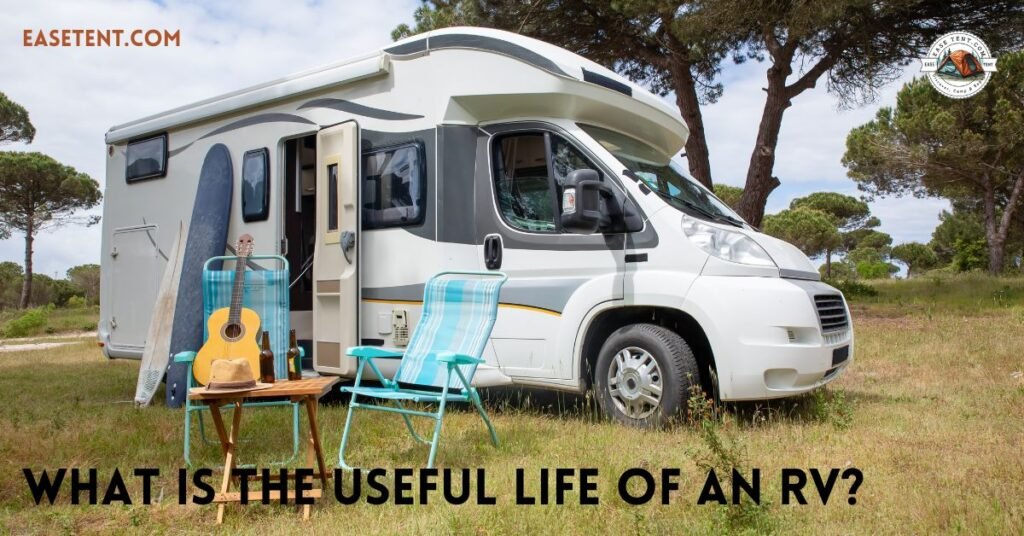
The useful life of an RV can vary depending on factors such as maintenance, usage, and overall care. Generally, a well-maintained RV can last for many years and miles of travel. Class A motorhomes, which are typically larger and more luxurious, may have a useful life of 10-20 years or more with proper upkeep. Travel trailers and fifth wheels can also have a similar lifespan when maintained regularly. It’s important to perform routine maintenance, address any issues promptly, and take good care of your RV to maximize its useful life and enjoyment over the years.
Where Are RVs used the most?
RVs are used extensively across various regions and for diverse purposes, but some areas see higher concentrations of RV usage than others:
Campgrounds and National Parks
RVs are popular in areas with abundant natural beauty and outdoor recreation opportunities, such as national parks, state parks, and campgrounds. These destinations attract RVers seeking scenic views, hiking trails, and camping experiences.
Coastal and Lakeside Areas
RV travelers for waterfront camping, fishing, boating, and beach activities favor coastal regions and lakeside destinations. Coastal routes like the Pacific Coast Highway and the Great Lakes Circle Tour are popular routes for RV trips.
Mountainous Regions
Mountainous areas, including the Rockies, Appalachians, and Sierra Nevada, are frequented by RVers for stunning vistas, cooler climates, and access to hiking, skiing, and other outdoor adventures.
Tourist Hotspots
Campers are commonly used to explore tourist hotspots and cultural attractions across the country, including cities like Las Vegas, Orlando, and San Francisco. RVers enjoy the flexibility of traveling to major destinations while having their accommodations on wheels.
Rural and Remote Areas
Recreational vehicles provide the freedom to explore remote and less-developed areas where traditional lodging options may be limited. This allows travelers to immerse themselves in nature and experience off-the-beaten-path locations.
Overall, RVs are versatile vehicles used by travelers seeking adventure, relaxation, and flexibility in their journeys. They are commonly seen in areas that offer outdoor activities, scenic beauty, and unique experiences that cater to the RV lifestyle.
What type of RV sells the most?
The type of RV that sells the most can vary based on market trends and consumer preferences, but generally, the following types of RVs are popular and commonly sold:
Travel Trailers
Travel trailers are towable RVs that are hitched to a vehicle for transport. They come in various sizes and floor plans, offering flexibility and affordability compared to motorized caravans. Travel trailers are often favored for their versatility and ability to be towed by a wide range of vehicles.
Fifth Wheels
Fifth wheels are a type of towable campers that attaches to a pickup truck using a specialized hitch. They typically offer more living space and amenities compared to traditional travel trailers, making them popular among families and long-term RVers.
Class C Motorhomes
Class C motorhomes are built on a truck chassis with an attached cab-over bunk area. They are more compact than Class A motorhomes but still offer ample living space and amenities. Class C motorhomes are popular for their maneuverability and affordability compared to Class A models.
Class A Motorhomes
Class A motorhomes are large, bus-like RVs that offer luxurious amenities and spacious interiors. They are favored by full-time RVers and those seeking a high level of comfort and convenience on the road.
Pop-Up Campers
Pop-up campers, also known as tent trailers or folding campers, are lightweight and compact RVs that fold down for easy towing and storage. They are popular for their affordability and simplicity, offering a basic camping experience with added comfort.
The type of RV that sells the most can depend on factors such as price, size, features, and intended use. Popularity may also vary based on regional preferences and lifestyle choices of RV enthusiasts. Ultimately, the best type of RV for an individual or family will depend on their specific needs, budget, and travel preferences.
What is the Best RV to Live In?
The best RV for full-time living depends on individual preferences, lifestyle, and budget. Generally, larger Class A or Class C motorhomes, fifth wheels, or spacious travel trailers with ample amenities like a full kitchen, bathroom, and comfortable sleeping areas are popular choices for full-time living. Consider factors such as floor plan, storage capacity, insulation for different climates, and overall comfort when choosing an RV for long-term living.
Does the Age of an RV Matter?
The age of an RV can impact its condition, maintenance requirements, and resale value. While newer RVs may offer modern features, older models can be more affordable and may have a proven track record of reliability. It’s essential to thoroughly inspect any used RV for signs of wear, water damage, and mechanical issues regardless of age. Proper maintenance and care are key factors in determining the longevity and performance of an RV, regardless of its age.
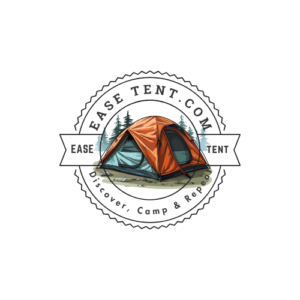
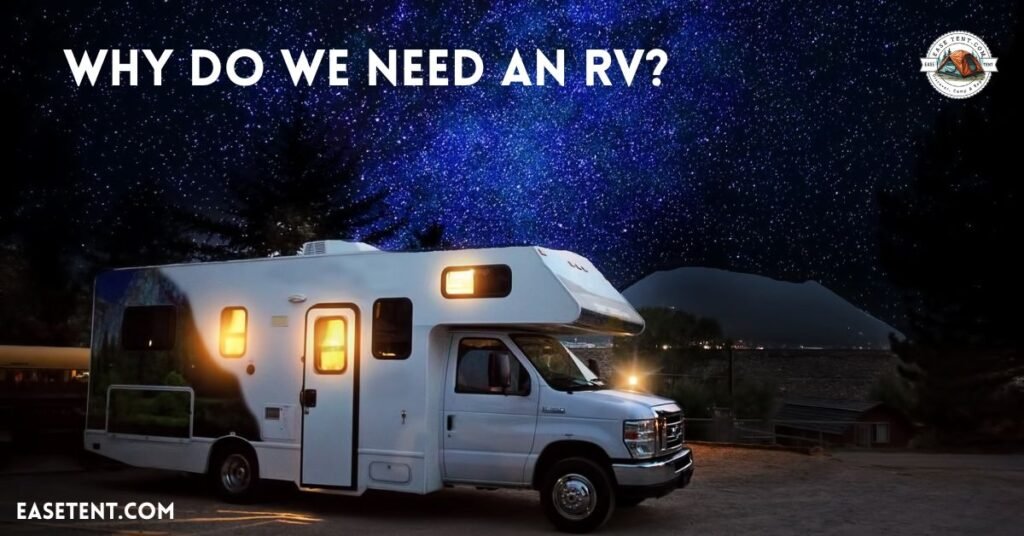
Pingback: Difference between Butane and Propane Regulators?
Pingback: Halloween Tent Decorating Ideas (Ultimate Guide) 2024
Pingback: How to Dispose of Camping Propane Tanks? - The Great Outdoors Blog
Pingback: RV Road Rules: What’s Safe and What's Not in a Moving Van?
Pingback: Do I need to Unplug my RV before Starting the Generator?
Pingback: When you use the Bathroom on an RV where does it go?
Pingback: Musty Smell from RV Air Conditioner - Mold Gone - The Great Outdoors Blog
Pingback: What kind of septic system do I need for my RV? 2024